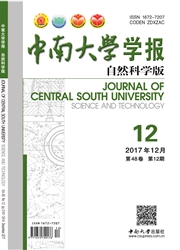

 中文摘要:
中文摘要:
分别考察4种石膏(脱硫石膏、天然石膏、建筑石膏和分析纯石膏)对充填料试块的强度影响。研究结果表明:在养护7 d和28 d时掺入脱硫石膏的试块强度最高;脱硫石膏掺量对充填料试块强度有很大影响:当脱硫石膏相对掺量(质量分数)逐渐增加时,充填料试块强度增加,当掺量为19%时,充填料试块强度最大,再增加掺量则强度下降;掺有脱硫石膏相比掺有分析纯石膏的充填料产生强度更高,是由于它的溶解速率以及"离子氛"所致;水化产物有大量钙钒石、C—S—H凝胶以及霞石等成分。
 英文摘要:
英文摘要:
Four types of different gypsum, i.e. flue gas desulfurization waste (FGDW) gypsum, natural gypsum, semihydrate building gypsum and chemical pure gypsum were used as active stimulator of the backfilling materials, and the strength of the backfilling material samples affected by these four types of gypsum were studied. The results show that the samples containing gypsum of FGDW have the highest strength of 7 d and 28 d curing. In addition, the strength of the backfilling material samples is also greatly affected by the mixing percent of the FGDW gypsum. The strength increases continuously when the FGDW gypsum content increases in the samples. The maximum strength occurs when the mixing amount of FGDW gypsum reaches 19% (mass fraction). The fitrther increase of FGDW gypsum in the samples causes the decrease of the samples strength. The samples containing gypsum of FGDW have higher strength than those of chemical pure gypsum because of the dissolution rate and ionic atmosphere. Large amount of reaction products is formed by the hydration reaction, and these include ettringite, C-S-H gel and nepheline minerals.
 同期刊论文项目
同期刊论文项目
 同项目期刊论文
同项目期刊论文
 期刊信息
期刊信息
